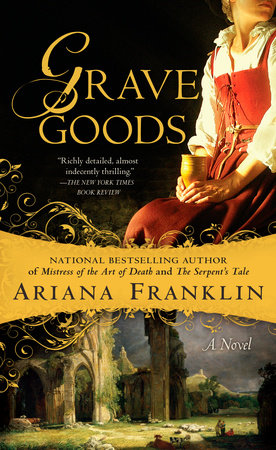READERS GUIDE
Questions and Topics for Discussion
INTRODUCTION
As established in Ariana Franklin’s previous novels Mistress of the Art of Death and The Serpent’s Tale, Vesuvia Adelia Rachel Ortese Aguilar is no ordinary medieval woman. Trained at the School of Medicine in Salerno and practiced in the nascent science of forensics, she is called by King Henry II to solve what may be the greatest mystery of the age. Skeletons have turned up in a sacred burial spot in Glastonbury, and all arrows point to the possibility that they are the remains of King Arthur and Queen Guinevere. If so, it means the end of a raison d’être for the Celt resistance and a Phoenix-like rise for fire-ravaged Glastonbury. Adelia knows she has to maintain professionalism despite the pressures that come with her biggest case yet, but at what cost to her career, her loved ones, and her own sanity? Hard truth is the only flag to fight under…this is her credo, and fight she must—against corrupt churchmen, desperate townspeople clinging to lies, a highway terrorist called Wolf, and forces of evil that dwell in the narrowest of minds and bitterest of hearts.
ABOUT ARIANA FRANKLIN
Ariana Franklin, author of City of Shadows, is the pen name of British writer Diana Norman. A former journalist, Norman has written several critically acclaimed biographies and historical novels. She lives in Hertfordshire, England, with her husband, the film critic Barry Norman.
DISCUSSION QUESTIONS- Grave Goods is in some ways a story driven by stories, from the legend of King Arthur’s power over the Celts to the lyrical songs that get Rhys the bard neck-deep in the action. What makes these stories so powerful?
- Adelia is a female scientist and doctor traveling with an entourage that includes her illegitimate daughter Allie, outspoken nurse Gyltha, and Mansur, an Arab eunuch who wears white robes and a turban. How does she leverage their other-ness so they can operate within an oppressive society?
- Emma seeks to gain land for her son Phillip, Adelia focuses on pursuing her career and maintaining her independence, and the dowager Lady Wolvercote goes to extraordinary lengths to protect her domain. Discuss the forces that motivate each of these women. Are they internal forces, external, or a combination of the two?
- On the surface, Adelia and King Henry II have little in common: she is a woman in his service: he is the most powerful figure in the land. She has a reputation as a healer and scientist; he is something of a brute. What are the shared values and attributes that eventually win each of them a measure of respect for the other?
- Despite her allegiance to truth and fact, over the course of her discoveries Adelia seems to fall under King Arthur’s spell. Why does she come to care about the legend, and what does she do to protect it?
- In the world of Grave Goods, honor and nobility of purpose are fluid characteristics that sometimes reside in unlikely people. For example, Adelia’s kidnappers try to absolve Eustace and save themselves, but they lead her to the secret burial ground of Wolf’s victims, prompting her to observe “Thieves they might be, but there was honor here—more honor than in a Christian abbey” (p. 192). How does Adelia’s flexible worldview serve her? How do other people’s more rigid views result in harm?
- Why does Adelia feel remorse at killing Wolf?
- At times, Adelia reminds herself of her full name: Vesuvia Adelia Rachel Ortese Aguilar. What does a strong sense of identity do for her? Are the women around her equally self-possessed?
- A free spirit like Adelia would struggle with the concept of marriage in any era, let alone in medieval times. Discuss the relationship between Adelia and Bishop Rowley. What are her reasons for not marrying him in the first place, and how does she decide to compromise? Can you make any predictions about their future together based on what is known?
- Abbot Sigward makes a startling, surprisingly joyous confession when Adelia confronts him about how his son really died. After his terrible crime he made a bargain with God—he’d give his life to the Church in exchange for protection from justice on Earth but at last his Nemesis arrives in the form of Adelia. Do you think justice is served in the end?
- Excalibur changes hands several times towards the novel’s end. Adelia keeps it in an attempt to date the body in the cave, then she hands it off to Roetger to heal his warrior spirit. When they realize the sword’s provenance, Roetger gives it back to Adelia, saying “I am not worthy; it belonged to a great heart, and to a great heart it must go” (p. 292). Finally Adelia presents Excalibur to King Henry II with the words “It belongs to the greatest heart of the age, which makes it yours. You are the Once and Future King” (p. 330). Who deserves Excalibur and its attendant powers, however mythological? Has it come to rest in the right hands?

